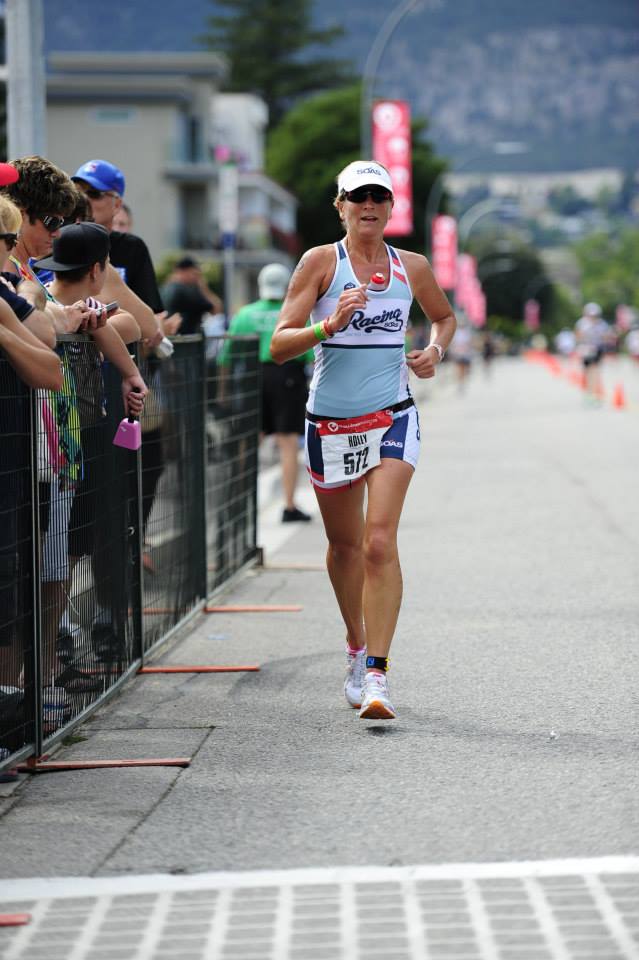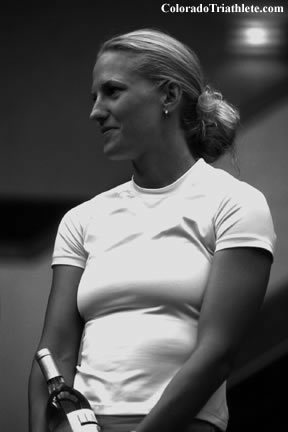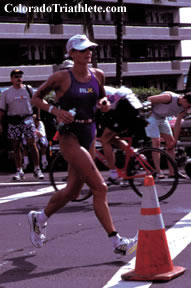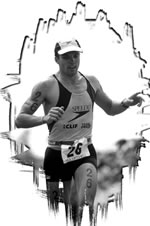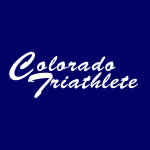Interview with First Year Pro Brooke Davison
July 6, 2009 (Boulder, CO) – Boulder’s Brooke Davison burst onto the triathlon scene in 2008 with a dominance rarely seen in the sport today. A 37-year old mother of three, Davison was a collegiate swimmer at the University of California at Berkeley in the early 90s. But it wasn’t until last year when she completed her first full season in the sport of triathlon.
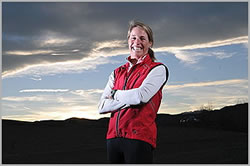
Of course, she did more than ‘complete’ a full season. She dominated it, placing as the first amateur in every race she entered. She won at St. Anthony’s, Boise 70.3, the Los Angeles Triathlon, and the Toyota US Open. Closer to home she swept the Boulder Triathlon Series, taking first overall at the 5430 Sprint Triathlon, first amateur/third overall at Boulder Peak, and first amateur/third overall at the 5430 Long Course.
She also went undefeated at two big end-of-season championship races. She earned the title of national champion at the USAT Age-Group National Championships, and became a world champion with her win at the IRONMAN 70.3 World Championships in Clearwater. To top everything off, she was named the 2008 Female Age Group Triathlete of the Year by USA Triathlon.
Colorado Triathlete caught up with this busy mother of three, and now professional triathlete, as she prepares for the Boulder Peak Triathlon.
Adam Hodges: Brooke, thanks for taking the time to talk with Colorado Triathlete. Your name should be familiar to our readers since it appeared in headline after headline during last year’s race season. You’ve competed—and won—at every distance from sprint to 70.3. What distance do you feel is your strongest? And do you have any plans of adding the IRONMAN distance to your repertoire?
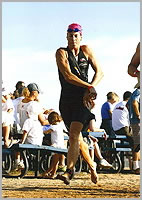 Brooke Davison: If you asked me this question last year (2008), I probably would have said Olympic distance was my forte. Yet so far this year, I have had more success with racing the 70.3 distance. That said, I love them both and have a few Olympic distance events coming up this summer that I hope to have better performances at again. As far as IRONMAN goes, this is something that I may pursue once all three kids are in school full time (2011/2012), yet probably not before that.
Brooke Davison: If you asked me this question last year (2008), I probably would have said Olympic distance was my forte. Yet so far this year, I have had more success with racing the 70.3 distance. That said, I love them both and have a few Olympic distance events coming up this summer that I hope to have better performances at again. As far as IRONMAN goes, this is something that I may pursue once all three kids are in school full time (2011/2012), yet probably not before that.
AH: Do you have a favorite course out of the triathlons you have competed in so far?
BD: The Boulder Peak is my favorite Olympic distance event. I love the local feel, being in my backyard, and I truly love the Old Stage climb. Of the 70.3’s I have competed at, Boise 70.3 is my favorite thus far.
AH: Last year, you were the first overall amateur at St. Anthony’s. This year, you raced in the pro division and finished eleventh. Tell us about your transition from elite amateur to pro this season. Is everything falling into place as planned or have you hit any obstacles along the way?
BD: It’s been an interesting year for me transitioning to the pro field. I anticipated a much smoother transition, and yet I have learned so much at each of my 4 races so far. I have had a fair bit of health issues that have prevented my showing up at races in optimal shape. I wouldn’t say everything is falling into place as I may have liked, yet the obstacles have all been learning opportunities and I feel that my best racing in 2009 is still ahead.
AH: Most professional triathletes begin their careers in their twenties. Do you feel you have faced any advantages or disadvantages by joining the pro ranks at age 37?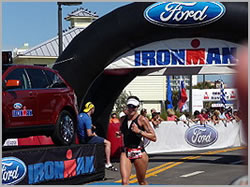
BD: The obvious disadvantage for me is my limited time and lack of experience. Yet, these disadvantages have also been to my advantage. For one, my limited time keeps me balanced, and I always look forward to the next training session. My lack of experience enables me to show up at races with the main priority of having fun and just doing my best. Being 37 and a mother of three young kids helps me maintain perspective. Triathlon is not my livelihood; it is a passion that I have had some success with, which is truly just a bonus!
AH: As a triathlete, do you find yourself drawing upon your competitive experiences as a collegiate swimmer or is triathlon a completely different ball game, so to speak?
BD: My competitive experiences as a swimmer certainly have a positive impact on my racing triathlon. I still love the thrill of race day, and I use my visualization techniques I learned during my swimming days. I also love the nerves, the anxiety, the lead up to race moment, and I wait for the moment before the gun when all goes quiet and you are ready to race. While the sports are a completely different ball game, the mental piece of the each sport has similarities, which is part of the draw to triathlon.
AH: What are your goals for your first season as a pro? And where do you see yourself going after this year?
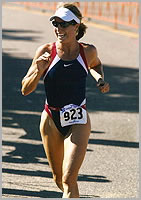 BD: My goals this year are to put my best foot forward at each and every race. I was hoping to qualify for Clearwater 70.3 World Championships, which I have done (at Boise 70.3). I want to improve my run substantially, and I would want to continue to have fun and model a healthy lifestyle for my children. After this year, with more experience under my belt, I hope to be able to be a strong contender at my main races—all 70.3’s, St. Anthony’s, Lifetime Series, etc.
BD: My goals this year are to put my best foot forward at each and every race. I was hoping to qualify for Clearwater 70.3 World Championships, which I have done (at Boise 70.3). I want to improve my run substantially, and I would want to continue to have fun and model a healthy lifestyle for my children. After this year, with more experience under my belt, I hope to be able to be a strong contender at my main races—all 70.3’s, St. Anthony’s, Lifetime Series, etc.
AH: You are a mother of three young children. How do you balance your busy schedule with the demands of training and racing at the elite level? What advice would you give to the other athletic mothers out there who are doing the balancing act of raising a family, pursuing a career, and living the multisport lifestyle?
BD: This is a question I am asked often. My answer is simple and true. While my life is never dull and I rarely have a moment to sit still, let alone rest and recover, I also find that by having my number one priority be my three children I maintain a balance in my training and life. I am never too consumed with triathlon, and it remains a passion in my life that helps balance me as a mother. The two, mothering and triathlon, are quite symbiotic for me.
That said, I miss key workouts more than is perhaps optimal. I do not get to rest and put my feet up ever. Yet I turn off triathlon when I am not training, and I turn off mothering (sort of) when I am training. My advice to other mothers is to strive for clear communication and pragmatic realism! The only way to get ones needs met is to communicate said needs. Usually that involves give and take, as well as being realistic about our roles as mothers.
I try not to compare myself to the young pros who live, breathe, eat triathlon. Triathlon is just one small aspect of my very full life.
AH: I can only imagine that your kids are active Boulder kids. Are they encouraged by what you do—or do you encourage them—to get involved in activities like swimming, biking and running?
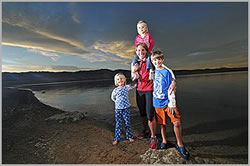 BD: Our kids are amazing. So far they have their own passions, and as much as I have “gently” encouraged them to get involved on swim team, they have no interest as of yet. However, they are fish in the water; love to ride bikes and our 8 year old ran the Boulder Bolder in 70 minutes this year.
BD: Our kids are amazing. So far they have their own passions, and as much as I have “gently” encouraged them to get involved on swim team, they have no interest as of yet. However, they are fish in the water; love to ride bikes and our 8 year old ran the Boulder Bolder in 70 minutes this year.
And this will be the first year that all three can participate in the Boulder Kids Triathlon (Lang was too young last year). The big kids have done the race for the past two years and they look to it as a highlight of their summer.
So that said, yes, I encourage them, yet I let them chart their own territory. And, apparently, they are indeed encouraged by what I do.
AH: There has been tremendous growth in triathlons for kids. The Boulder Peak Kids Triathlon is but one example. As a mother and a teacher, could you share with us your philosophy on youth development? Presumably you swam during your own youth. How did that experience shape your life? What role do you feel sports like swimming and triathlon should play in the lives of kids today?
BD: I started swimming on a team at age 7. It quickly became a big part of my life because I found something I truly loved.
That experience of being involved in a sport that required commitment, dedication, hard work, time management, and discipline was the absolute shaping experience of my childhood.
There is no doubt that this early experience nurtured me into who I am today. I am organized, appreciate my health and functional body, I love exercise (and the endorphins that go along with it!), and I see it as an integral part of my every day.
I would like to see all kids involved in sports, even recreational. My sincere hope for all children is that they find a passion and pursue it. For some that might be sport, and for others that might be music.
Either way, I do believe there is a positive place for exercise in all children’s lives. And in my ideal world, I would see each of my children participating in a sport that they love and reaping the benefits of a healthy lifestyle at an early age.
AH: How has your outlook on life changed over the past few years since you’ve become involved in the multisport lifestyle?
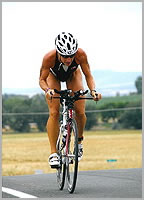 BD: I appreciate every moment. I care more about what I put in my body. I care more about getting sleep. I am more conscious of my health and its direct impact on my children and their health. I am inspired by every other triathlete and feel so fortunate to have literally fallen into this amazing sport.
BD: I appreciate every moment. I care more about what I put in my body. I care more about getting sleep. I am more conscious of my health and its direct impact on my children and their health. I am inspired by every other triathlete and feel so fortunate to have literally fallen into this amazing sport.
AH: Could you give us a few insights into some of your nutritional strategies—your favorite pre-race meal or what you eat on race morning, for example?
BD: I eat well. I don’t count calories, yet I also pay close attention to what I put in my body. I strive for a balanced diet that not only keeps me fueled and energized, yet also aids in my recovery and preparation for the next training session.
I eat a good breakfast, a solid lunch, a decent dinner and snack on fruits and nuts all day. I do have to maintain my race weight so I can train optimally.
A challenge of mine is that I am usually hungry throughout the day. Rarely do I feel satisfied. I typically eat a Forze GPS bar mid-morning and sometimes again in the mid-afternoon. These bars leave me feeling full and get me through the times of day when I might otherwise reach for empty calories which do nothing for me and just add weight.
My favorite pre-race meal is a simple bowl of oatmeal, yogurt, some sort of berry, and usually some nut butter. I also throw in a banana.
AH: You will be competing in the Boulder Peak Triathlon again this year. Last year, you were the first amateur and third overall at the race. How will you approach the race differently this year given all the experience you’ve gained over the past year?
BD: I love this race. It was my first triathlon ever in 2007 and thus it will always have a special place in my heart. This year, I will approach this race fairly methodically.
The pro field starts a bit later than the amateurs and it is typically a very hot Boulder day, so I will be sure to stay hydrated and prepared for the hot run. I plan on breaking up the race into manageable pieces—the swim, the approach to and over Old Stage, the rollers on 63rd, and the run is three loops. It should be great fun, competitive and HOT!
The only difference in my approach this year given my experience will be managing my own expectations of myself. I have a lot of internal pressure that I need to manage. Yet as long as I continue to have fun, I have nothing to lose.
Of course, I can’t wait to be in the race and toe the line with some of the finest triathletes in the sport. That in itself is a true honor and one of the great joys of racing at the pro level.
AH: Thanks for talking with us, Brooke. Good luck at Boulder Peak and with the rest of your season! We’ll keep following your results here at Colorado Triathlete.

